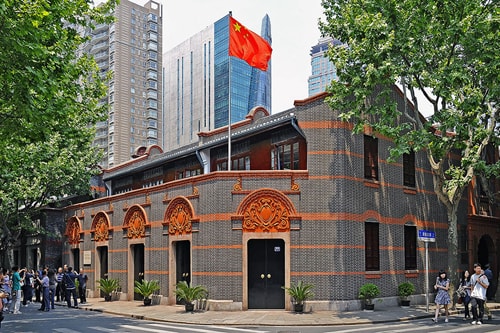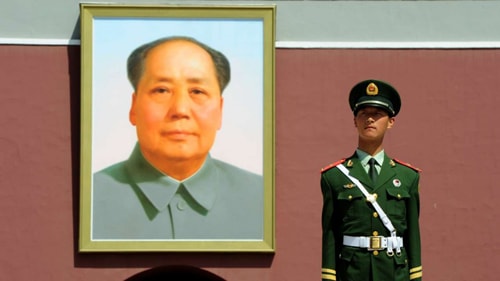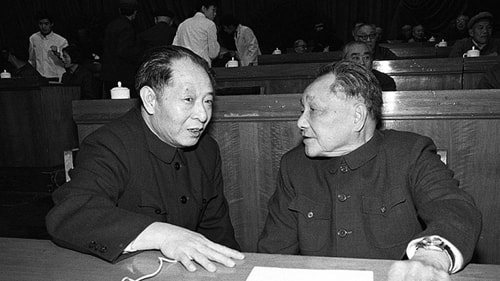Notable congresses of the Communist Party of China
Many congresses of the Communist Party of China have made important decisions that greatly affect the development process of this country.
 |
| The house where the first congress of the Communist Party of China took place. Photo: SCMP. |
The National Congress of the Communist Party of China (CPC) is the most important political event in the country, including congresses of great significance that contribute to changing the face of modern China, according to Reuters.
First Congress
The first congress of the Communist Party of China took place from July 23 to July 31, 1921, at a secret location in Shanghai and then on a boat in Nanhu, Jiaxing District, Zhejiang Province. Twelve delegates, including Mao Zedong, represented more than 50 party members attending the congress to discuss the founding of the Communist Party of China and to adopt the party platform and charter.
This event marked the birth of the Communist Party of China, however due to some mistaken information that the first congress took place from July 1 to July 5, 1921, July 1, 1921 was taken as the founding date of the party. Later, the date of the congress was verified, but July 1 is still considered the founding date of the Communist Party of China.
The congress elected three people, Tran Doc Tu, Truong Quoc Dao and Ly Dat, to the Central Bureau, of which Tran Doc Tu was the Central Secretary.
Seventh Congress
The 7th Congress of the CPC took place from April 23 to June 11, 1945, during the final stage of the war of resistance against Japan. 544 official delegates and 208 alternate delegates represented 1.21 million party members at the congress in Yan'an, a small village in northern China's Shaanxi province.
The congress adopted a new CPC constitution, which emphasizes that "the party takes Mao Zedong Thought integrated with Marxism-Leninism" as the guiding principle for all actions, marking Mao Zedong's ascension to the top leader of the CPC.
This action is believed to have helped the CPC achieve an unprecedented level of solidarity and unity, creating a foundation for final victory over Japanese fascism and building a new democratic China.
The congress elected a new Central Committee consisting of 44 official members and 33 alternate members. Mao Zedong was elected chairman of the Central Committee.
The ninth congress
 |
| Portrait of Mao Zedong in Tiananmen Square. Photo: Reuters. |
The ninth congress of the CPC was held in April 1969 in Beijing, at the height of the Cultural Revolution initiated by Mao Zedong in 1966, which had caused considerable damage to the party. Many provincial-level party committees and grassroots party cells were eliminated, and most party members had not yet returned to normal party activities.
At this congress, Mao Zedong chose Marshal Lin Biao as his successor, continued to affirm the theory and methods of implementing the Cultural Revolution, and dismissed more than 80% of the members of the Party Central Committee.
The congress elected Mao Zedong as chairman of the Central Committee, and Lin Biao as vice chairman. Two years later, Lin Biao died in a plane crash.
12th Congress
The 12th Congress took place in September 1982 in Beijing, aiming to summarize the practices since the 11th Party Congress and eliminate the negative influences left by the chaotic period of the Cultural Revolution.
In his opening speech, leader Deng Xiaoping proposed the concept of "socialism with Chinese characteristics", promoting economic reform from central planning to a market economy.
The Congress identified one of the CPC's tasks in the "new historical period" as quadrupling the value of industrial and agricultural output from 710 billion yuan in 1980 to about 2,800 billion yuan by 2000 so that people could have a higher standard of living.
The congress elected a new Central Committee of 210 official members and 138 alternate members, a Central Advisory Committee of 172 members, and a Central Commission for Discipline Inspection of 132 members. Hu Yaobang was elected general secretary, while Deng Xiaoping served as chairman of the Central Military Commission and chairman of the Central Advisory Committee.
 |
| Deng Xiaoping (right) and Hu Yaobang at the party congress in 1978. Photo: SCMP. |
16th Congress
Held in November 2002 in Beijing, the 16th Congress was the first time the Chinese Communist Party officially allowed private businessmen to become members. The Congress also included Jiang Zemin's "Three Represents" doctrine in the Chinese Communist Party Constitution.
The "Three Represents" theory asserts that the Communist Party of China represents advanced productive forces, advanced culture, and the interests of the majority of the Chinese people. This theory shows that the CPC regards intellectuals and entrepreneurs as advanced productive forces, the private economy as the leading force, and the economy as governed by the market mechanism.
During this congress, Hu Jintao was elected as general secretary. However, the position of chairman of the Central Military Commission was still held by Jiang Zemin until 2005 when he handed it over to Hu Jintao.
Xi Jinping and Li Keqiang were elected directly to the nine-member Politburo Standing Committee at the 17th congress in 2007, despite not being Politburo members at the time. This made them the shining stars of the fifth generation of leaders, who would later become China's President and Premier.
According to VNE
| RELATED NEWS |
|---|

